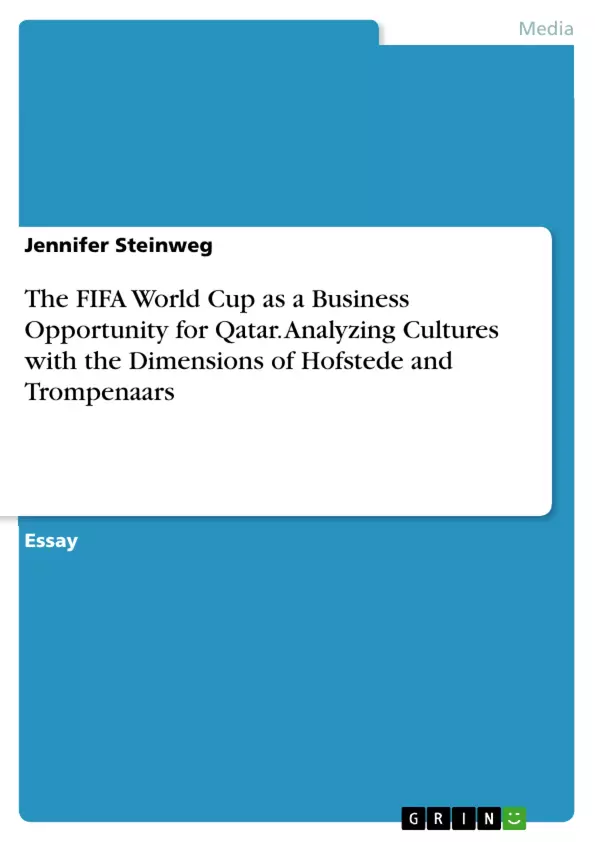This essay deals with the current situation and ethical issues in Qatar as well as the working conditions and the way of life.
Moreover, the cultural dimensions of Trompenaars and Hofstede are examined and analyzed closely.
Inhaltsverzeichnis (Table of Contents)
- Task I
- Current situation in Qatar and ethical issues
- Recommendations and Conclusions
- Task II
- Analysing the different cultures based on Hofstede and Trompenaars` Culture Dimensions
- Relevant dimensions of Hofstede's Cultural Dimensions
- Relevant dimensions of Trompenaars Cultural Dimensions
- Solution
Zielsetzung und Themenschwerpunkte (Objectives and Key Themes)
This document analyzes the current situation in Qatar, focusing on ethical issues related to the 2022 FIFA World Cup. It examines the potential business opportunities in Qatar while exploring the cultural differences between Qatar and other countries through the lens of Hofstede and Trompenaars' cultural dimensions.
- Ethical concerns regarding labor conditions in Qatar's construction sector
- The 'kafala' system and its impact on migrant workers' rights
- Business opportunities in Qatar
- Cultural differences between Qatar and other nations
- Recommendations for addressing ethical challenges and improving worker welfare
Zusammenfassung der Kapitel (Chapter Summaries)
- Task I: This section delves into the current situation in Qatar, highlighting the ethical issues surrounding the construction projects related to the 2022 FIFA World Cup. It discusses the 'kafala' system, its limitations, and the impact on migrant workers. The chapter also outlines the poor living and working conditions faced by workers, including low wages, excessive working hours, and inadequate health and safety measures.
- Task II: This section explores the cultural differences between Qatar and other nations by analyzing relevant dimensions of Hofstede and Trompenaars' cultural frameworks. It provides insights into the cultural nuances that need to be considered for successful business ventures and intercultural communication in Qatar.
Schlüsselwörter (Keywords)
This document focuses on ethical considerations in international business, human rights, migrant worker exploitation, the 'kafala' system, cultural dimensions, Hofstede's Cultural Dimensions, Trompenaars Cultural Dimensions, Qatar, FIFA World Cup, and business opportunities in the Middle East.
Frequently Asked Questions
What are the main ethical issues regarding the FIFA World Cup in Qatar?
The primary concerns involve poor working conditions for migrant workers in the construction sector, low wages, and inadequate health and safety measures.
What is the 'kafala' system and why is it controversial?
The 'kafala' system is a sponsorship framework that limits the rights of migrant workers, often preventing them from changing jobs or leaving the country without their employer's permission.
Which cultural frameworks are used to analyze Qatar in this essay?
The essay utilizes Hofstede’s Cultural Dimensions and Trompenaars’ Culture Dimensions to examine the cultural differences between Qatar and other nations.
Does the World Cup present business opportunities in Qatar?
Yes, the document explores potential business opportunities in the Middle East arising from the large-scale infrastructure and tourism needs of the event.
What recommendations are made regarding worker welfare?
The report provides suggestions for improving labor rights, addressing ethical challenges, and ensuring better living conditions for the workforce.
- Arbeit zitieren
- Jennifer Steinweg (Autor:in), 2014, The FIFA World Cup as a Business Opportunity for Qatar. Analyzing Cultures with the Dimensions of Hofstede and Trompenaars, München, GRIN Verlag, https://www.grin.com/document/303063



